Memphis, Tennessee Blood Testing Facilities
 Represents a LabCorp blood testing facility
Represents a LabCorp blood testing facility Represents a Quest Diagnostics blood testing facility
Represents a Quest Diagnostics blood testing facility

Nearby Labcorp Blood Testing facilities:
- Labcorp Center Distance: 10 m, 1120 Main St, Southaven, Desoto County, MS, 38671
- Labcorp Center Distance: 11 m, 6100 Primacy Pkwy Ste 106, Memphis, Shelby County, TN, 38119
- Labcorp Center Distance: 14 m, 8001 Centerview Pkwy 120, Cordova, Shelby County, TN, 38018
- Labcorp Center Distance: 77 m, 159 Northstar Drive, Jackson, Madison County, TN, 38305
- Labcorp Center Distance: 95 m, 1300 Sunset Drive Ste D, Grenada, Grenada County, MS, 38901
Nearby Quest Blood Testing facilities:
- Quest Center Distance: 14 m, 2075 Exeter Rd, Germantown, Shelby County, TN, 38138-3920
- Quest Center Distance: 59 m, 901 Osler Dr, Jonesboro, Craighead County, AR, 72401-4319
Memphis Hormone Replacement Therapy Services
Hormone Optimization is a 21st century medical therapy regimen that is designed to help you combat the effects of aging related to Hormone Deficiency and Imbalance. The Conscious Evolution Institute specializes in Hormone Treatments such as HGH Therapy and Testosterone Replacement Therapy in an effort to help our patients overcome Hormone Imbalance in order to live a healthier and happier life. We have medical affiliates located all throughout the Memphis metropolitan area, as well as the entire state of Tennessee.
Hormone Imbalance exacerbates the aging process and can literally shave years off your life. For patients with Hormone Deficiency, Bio-Identical and Recombinant Hormone Therapies can help restore natural hormone balance, improving quality of life.If you feel that you may benefit from the Hormone Services that we provide, we encourage you to contact us by filling out the contact form on this page, or give us a call at the number provided above. If our clinical evaluation reveals that you can benefit from Hormone Treatment, we can have quality Hormone Replacement Products shipped straight to your home.
Memphis Testosterone Therapy for Low-T and Testosterone Deficiency
There are millions of males across the United States that suffer from Age-Related Testosterone Deficiency, also known as Andropause. Sadly, a huge portion of these patients don't get the care that they need and deserve. Testosterone Deficiency leads to a wide variety of symptoms that impede health. Low-T leads to sexual dysfunction and loss of libido. It also leads to various physical and psychological symptoms, such as fatigue, loss of muscle mass, depression, anxiety, cognitive decline, and loss of Bone Mineral Density.
Luckily, Testosterone Deficiency is easily treated with Bio-Identical Testosterone Replacement Therapy, and is highly safe and effective when used as directed for treatment of legitimate need. Testosterone Therapy comes in many different forms, including Testosterone Patches, Testosterone Creams, and Testosterone Injections, designed to boost Testosterone concentrations to normal and healthy, youthful levels.
Memphis HGH Therapy for Growth Hormone Deficiency
Human Growth Hormone Therapy is another of the fine Bio-Identical medical treatments that we provide at the Conscious Evolution Institute. Most patients are aware of the benefits of Testosterone Therapy, but most men and women are much less versed in the benefits of HGH Injection Treatment and the pitfalls of HGH Deficiency and Hypopituitarism.
Human Growth Hormone is in control of a process known as cellular metabolism, and, as we grow older, the production of the hormone falls into decline. This leads to a variety of symptoms such as unexplained weight gain, loss of strength, inhibited healing, and reduced resistance to illness, as well as an increased risk of conditions such as hypertension, diabetes, and stroke. HGH Injection Therapy can mitigate the effects of HGH Deficiency, allowing patients to look and feel better while also improving quality of life.
Memphis Sermorelin Acetate Therapy for Growth Hormone Deficiency
Along with Injectable HGH Therapy, our Hormone Clinic also provides Sermorelin Injection Therapy, which has also been shown to be highly effective vs. Human Growth Hormone Deficiency, perhaps even moreso than HGH Injections for many patients. Sermorelin stimulates the natural production of Growth Hormone by the pituitary, allowing the human body more control over HGH concentrations over time. This increases the effectiveness of treatment, and reduces the risk of tachyphylaxis, or natural resistance. Sermorelin is cheaper than HGH Therapy and can be prescribed off-label by a qualified physician, meaning that, even if you don't qualify for Growth Hormone, you still may be able to benefit from HGH Restoration!
Memphis HCG Diet for Weight Loss
Along with our fantastic Hormone Replacement Products, we also offer some Hormone Therapy Treatments designed to recalibrate your health and your life. HCG Therapy, combined with a low calorie diet, is a highly effective weight loss treatment that can lead to weight loss of up to thirty pounds per month, allowing patients to quickly and easily drop the weight. Also, HCG has some other benefits that make it great for dieting. For example, HCG protects muscle mass and increases the rate of bodyfat metabolism. Furthermore, it also suppresses feelings of hunger that make diets so difficult to follow effectively. If you are overweight or obese and have been failed by other diets in the past, the HCG Diet may be the weight loss option that you've been looking for!
Memphis, Tennessee Information
Memphis is located in the southwest portion of Tennessee, and borders the Mississippi river. The suburbs of Memphis extend into both Arkansas and Mississippi. Suburbs include Germantown, Southaven, Bartlett, and Olive Branch. Memphis is the most populous city in the state of Tennessee, ahead of Nashville, but the 2nd most populous metropolis, behind Nashville and ahead of Knoxville. Memphis goes by a number of nicknames, including the BBQ Capital of the World, the Birthplace of Rock and Roll, and the River City.
Memphis is most well-known for two things. First, Memphis is known as the home of Elvis Presley, who is widely considered to be the father of modern Rock and Roll. As such, Graceland is one of the most popular tourist destinations in the United States, and is actually the most popular historical residence for tourists, save only for the White House. Memphis is also known for Beale Street, a popular entertainment district dedicated to music, dancing, and great food. Beale street is located immediately in front of the FedEx Forum, where both the NBA Memphis Grizzlies, and the University of Memphis Tigers play basketball.
FedEx is the largest and most important employer in the city. Memphis is a very important transportation hub, because of its location along the Mississippi River. It is also a gateway to both western and southeastern trade. Along with FedEx, International Paper, and AutoZone are also located in Memphis. There are lots of things to see and do in Memphis, along with the points of interest listed earlier. Museums in Memphis include the Belz Museum of Asian and Judaic Art, the Brooks Museum of Art, and the National Civil Rights Museum. The Memphis Zoo is also a very popular attraction.
All About Memphis, Tennessee Geographic Area
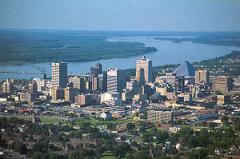

Memphis is a city in the southwestern corner of the U.S. state of Tennessee, and the county seat of Shelby County. The city is located on the 4th Chickasaw Bluff, south of the confluence of the Wolf and Mississippi rivers.
Memphis had a population of 646,889 at the 2010 census, making it the largest city in the state of Tennessee, the third largest in the Southeastern United States, and the 20th largest in the United States. The greater Memphis metropolitan area, including adjacent counties in Mississippi and Arkansas, had a 2010 population of 1,316,100. This makes Memphis the second largest metropolitan area in Tennessee, surpassed only by metropolitan Nashville, which has overtaken Memphis in recent years. Memphis is the youngest of Tennessee's major cities. A resident of Memphis is referred to as a Memphian, and the Memphis region is known, particularly to media outlets, as "Memphis & The Mid-South".

Because it occupies a substantial bluff rising from the Mississippi River, the site of Memphis is a natural location for settlement. The area was first settled by the Mississippian Culture and then by the Chickasaw Indian tribe. For 10,000 years they occupied the bluffs along the river, building a large mound on the bluff. European exploration came later, beginning in the 16th century with Spanish explorer Hernando de Soto and French explorers led by Rene-Robert Cavelier, Sieur de La Salle.
In 1795 the Spanish governor of Louisiana, Manuel Gayoso de Lemos, acquired land for a fort from the Chickasaw. Fort San Fernando de las Barrancas was built in the summer of 1795 on the fourth Chickasaw Bluff, just south of the Wolf River. It gave Spain control of navigation on the Mississippi River in the region until 1797 when it was abandoned in keeping with Pinckney's Treaty. The fort was dismantled, its lumber and iron shipped away. Its ruins went unnoticed when Memphis was laid out twenty years later.
The land comprising present-day Memphis remained in a largely unorganized territory throughout most of the 18th century. In 1796, the site became the westernmost point of the newly admitted state of Tennessee, located in the Southwest United States.
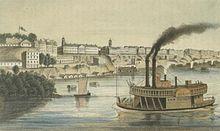
Memphis was founded in 1819 by John Overton, James Winchester and Andrew Jackson. The city was named after the ancient capital of Egypt on the Nile River. Memphis developed as a transportation center in the 19th century because of its flood-free location, high above the Mississippi River.
As the cotton economy of the antebellum South depended on the forced labor of large numbers of African-American slaves, Memphis became a major slave market. In 1857, the Memphis and Charleston Railroad was completed, the only east-west railroad across the southern states prior to the Civil War.
Tennessee seceded from the Union in June 1861, and Memphis briefly became a Confederate stronghold. Union ironclad gunboats captured the city in the naval Battle of Memphis on June 6, 1862, and the city remained under Union control for the duration of the war. Memphis became a Union supply base and continued to prosper throughout the war. Meanwhile, Confederate General Nathan Bedford Forrest harassed Union forces in the area.
In the 1870s, a series of yellow fever epidemics devastated Memphis. The worst outbreak, in 1878, reduced the population by nearly 75% as many people died or fled the city permanently. Property tax revenues collapsed, and the city could not make payments on its municipal debts. As a result, Memphis temporarily lost its city charter and was a taxing district from 1878 ae1893. The city was rechartered in 1893.
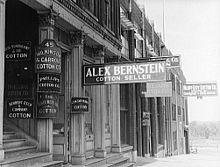
Memphis grew into the world's largest spot cotton market and the world's largest hardwood lumber market. Into the 1950s, it was the world's largest mule market.
From the 1910s to the 1950s, Memphis was a place of machine politics under the direction of E. H. "Boss" Crump. During the Crump era, Memphis developed an extensive network of parks and public works as part of the national City Beautiful movement. Determined never to suffer plagues again, it rebuilt with meticulous sanitation and drainage. However, it did not encourage heavy industry and allowed Mr. Crump's censor to ban movies.
During the 1960s, the city was at the center of civil rights issues, notably a sanitation workers' strike. The Lorraine Motel in the city was also the venue of the assassination of Martin Luther King, Jr. on April 4, 1968, the day after giving his prophetic I've Been to the Mountaintop speech at the Mason Temple. In 1970, the Census Bureau reported Memphis' population as 60.8% white and 38.9% black.
Memphis is well known for its cultural contributions to the identity of the American South. Many renowned musicians grew up in and around Memphis and moved from the Mississippi Delta. These included such musical greats as Elvis Presley, Jerry Lee Lewis, Muddy Waters, Carl Perkins, Johnny Cash, Robert Johnson, W. C. Handy, B.B. King, Howlin' Wolf, Isaac Hayes, Booker T. Jones, Al Green, Alex Chilton, Justin Timberlake, Three 6 Mafia, The Sylvers, Jay Reatard and many others.
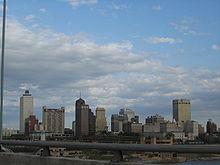
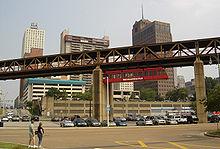
Memphis is located in southwestern Tennessee at 35 °7 a²3 a³N 89 °58 a²16 a³W / 35.1175 °N 89.97111 °W / 35.1175; -89.97111. According to the United States Census Bureau, the city has a total area of 324.0 square miles (839.2 km2), of which 315.1 square miles (816.0 km2) is land and 9.0 square miles (23.2 km2), or 2.76%, is water.
Downtown Memphis rises from a bluff along the Mississippi River, and the city sprawls outward over southwest Tennessee and into northern Mississippi and eastern Arkansas. Several large parks are scattered through the city, notably Overton Park in Midtown and the 4,500 acres (18 km2) Shelby Farms. The city is a national transportation hub and Mississippi River crossing for Interstate 40, (east-west), Interstate 55 (north-south), barge traffic, Memphis International Airport (FedEx's "SuperHub" facility) and numerous freight railroads that serve the city.
Shelby County is located over four natural aquifers, one of which is recognized as the "Memphis sand aquifer" or simply as the "Memphis aquifer". This artesian water is pure and soft. This particular water source, located some 350 to 1,100 feet (110 to 340 m) underground, is estimated by Memphis Light, Gas and Water to contain more than 100 trillion US gallons (380 km3) of water.
Memphis has a humid subtropical climate, with four distinct seasons. Winter weather comes from the upper Great Plains or from the Gulf of Mexico, leading to drastic swings in temperature. Summer weather may come from Texas (very hot and humid) or the Gulf (hot and very humid). July has an average high and low of 91.6 °F (33.1 °C) and 73.8 °F (23.2 °C), with high levels of humidity due to moisture encroaching from the Gulf of Mexico. Afternoon and evening thunderstorms are frequent during summer, but usually brief, lasting no longer than an hour. Early autumn is pleasantly drier and mild, but can be hot until late October. Late autumn is rainy and cooler; precipitation peaks again in November and December. Winters are mild to chilly, with average January high and low temperatures of 49.8 °F (9.9 °C) and 32.6 °F (0.3 °C). Snow occurs sporadically in winter, with an average yearly snowfall of 3.9 inches (99 mm). Ice storms and freezing rain pose greater danger, as they can often pull tree limbs down on power lines and make driving hazardous. Severe thunderstorms can occur at any time of the year though mainly during the spring months. Large hail, strong winds, flooding and frequent lightning can accompany these storms. Some storms spawn tornadoes.
The lowest temperature ever recorded in Memphis was na13 °F ( na25 °C) on December 24, 1963, and the highest temperature ever was 108 °F (42 °C) on July 13, 1980.
Annual precipitation is high (53.68 inches (1,360 mm)) and is relatively evenly distributed throughout the year, though the period August through October can be much drier. Rainfall peaks again in March aeMay and November aeDecember.
For historical population data, see: History of Memphis, Tennessee.
According to the 2006 ae2008 American Community Survey, the racial composition of Memphis was:
As of the census of 2000, there were 650,100 people, 250,721 households, and 158,455 families residing in the city. The population density was 2,327.4 people per sq mi (898.6/km ²). There were 271,552 housing units at an average density of 972.2 per sq mi (375.4/km ²). The racial makeup of the city was 61.41% African American, 34.41% White, down from 62.8% in 1950, 1.46% Asian, 0.19% Native American, 0.04% Pacific Islander, 1.45% from other races, and 1.04% from two or more races. Hispanic or Latino of any race were 2.97% of the population.
The median income for a household in the city was $32,285, and the median income for a family was $37,767. Males had a median income of $31,236 versus $25,183 for females. The per capita income for the city was $17,838. About 17.2% of families and 20.6% of the population were below the poverty line, including 30.1% of those under age 18 and 15.4% of those age 65 or over.
The Memphis Metropolitan Statistical Area (MSA), the 42nd largest in the United States, has a 2010 population of 1,316,100 and includes the Tennessee counties of Shelby, Tipton, and Fayette, as well as the Mississippi counties of DeSoto, Marshall, Tate, and Tunica, and Crittenden County, Arkansas.
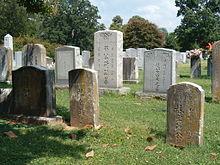
Since its founding, Memphis has been home to persons of many different faiths. An 1870 map of Memphis shows religious buildings of the Baptist, Catholic, Episcopal, Methodist, Presbyterian, Congregational, and other Christian denominations and a Jewish congregation. In 2009, places of worship exist for Christians, Jews, Hindus, Buddhists, and Muslims.
The international headquarters of the Church of God in Christ, the second largest Pentecostal denomination in the United States, is located in Memphis. Named after the denomination's founder, Charles Harrison Mason, Mason Temple is where Martin Luther King, Jr. gave his famous "I've Been to the Mountaintop" speech the day before he was killed. The church's Temple of Deliverance is the venue of the National Civil Rights Museum's Freedom Awards.
Bellevue Baptist Church is a Southern Baptist megachurch in Memphis that was founded in 1903. Its current membership is approximately 27,000. For many years, it was led by the late Adrian Rogers, a three-term president of the Southern Baptist Convention.
Other notable and/or large churches in Memphis include Second Presbyterian Church (EPC), Evergreen Presbyterian Church (PCUSA), Colonial Park United Methodist Church, Christ United Methodist Church, Idlewild Presbyterian Church (PCUSA), The Pentecostal Church (UPCI), Calvary Episcopal Church, and Elliston Baptist Church.
Memphis is home to two cathedrals. The Cathedral of the Immaculate Conception is the seat of the Roman Catholic Diocese of Memphis, and St. Mary's Episcopal Cathedral is the seat of the Episcopal Diocese of West Tennessee.
The Church of Jesus Christ of Latter-day Saints has two stakes in Memphis. The Memphis Tennessee Temple is located in Bartlett, Tennessee.
Memphis is home to an estimated 10,000 to 15,000 Muslims of various cultures and ethnicities.
Memphis is home to Temple Israel, a Reform synagogue that has approximately 7,000 members, making it one of the largest Reform synagogues in the country. Baron Hirsch Synagogue is the largest Orthodox shul in the United States.
A number of Seminaries are located in Memphis and the metropolitan area. Memphis is home to Harding School of Theology and Memphis Theological Seminary. Suburban Cordova is home to Mid-America Baptist Theological Seminary. Germantown is home to a campus of Union University.
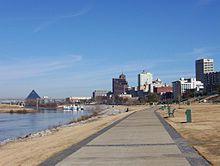
One of the largest celebrations the city has is Memphis in May. The month-long series of events promotes Memphis' heritage and outreach of its people far beyond the city's borders. There are four main events, the Beale Street Music Festival, International Week, the World Championship Barbecue Cooking Contest, and the Sunset Symphony. The World Championship Barbecue Cooking Contest is the largest pork barbecue cooking contest in the world.
In April, there is an event in downtown Memphis called Africa in April Cultural Awareness Festival, or simply known as Africa in April. The festival was designed to celebrate the arts, history, culture, and diversity of the African diaspora. Africa in April is a three-day festival with vendor's markets, fashion showcases, blues showcases, and an international diversity parade.
During June, Memphis is home to the Memphis Italian Festival at Marquette Park. For over 20 years, the festival has hosted musical acts, local artisans, and Italian cooking competitions. It also presents chef demonstrations, the Coors Light Competitive Bocce Tournament, the Galtelli Cup Recreational Bocce Tournament, a volleyball tournament, and pizza tossing demonstrations.
Carnival Memphis, formerly known as the Memphis Cotton Carnival, is an annual series of parties and festivities in June that salutes various aspects of Memphis and its industries. An annual King and Queen of Carnival are secretly selected to reign over Carnival activities. The African-American community staged a parallel event known as the Cotton Makers Jubilee from 1935 to 1982, when it merged with Carnival Memphis.
A market and arts festival, the Cooper-Young Festival, is held annually in September in the Cooper-Young district of Midtown Memphis. The event draws artists from all over North America and includes local music, art sales, contests, and displays.
Memphis is also home to several film festivals, the Indie Memphis Film Festival, Outflix, and the Memphis International Film and Music Festival. The Indie Memphis Film Festival is in its 15th year and will be held November 1 ae4, 2012. Recognized by MovieMaker Magazine as one of 25 "Coolest Film Festivals" (2009) and one of 25 "Festivals Worth the Entry Fee" (2011), Indie Memphis offers Memphis year-round independent film programming including the Global Lens international film series, IM Student Shorts student films, and an outdoor concert film series at the historic Levitt Shell. The Outflix Film Festival, also in its 15th year, will take place September 7 ae13, 2012. Outflix features a full week of LGBT interested cinema, including short films, features, and documentaries. The Memphis International Film and Music Festival is held in April and is in its 11th year and takes place at Malco's Ridgeway Four.
Formerly titled the W. C. Handy Awards, the International Blues Awards are presented by the Blues Foundation (headquartered in Memphis) for Blues music achievement, with weeklong competitions and an awards banquet including a night of performance and celebration.
Memphis is the home of founders and establishers of various American music genres, including Memphis soul, Memphis blues, gospel, rock n' roll, Buck, crunk, and "sharecropper" country music (in contrast to the "rhinestone" country sound of Nashville).
Musicians like Jerry Lee Lewis, Johnny Cash, Elvis Presley, Carl Perkins, Roy Orbison, Booker T. & the M.G.'s, Otis Redding, Isaac Hayes, Sam & Dave and B.B. King all got their start in Memphis in the 1950s/60s.
Beale Street is a national historical landmark, and shows the impact Memphis has had on American blues, particularly after World War II as electric guitars took precedence. Sam Phillips' Sun Studio, the most seminal recording studio in American popular music, still stands, and is open for tours. Elvis, Johnny Cash, Jerry Lee Lewis, Carl Perkins, and Roy Orbison all made their first recordings there and were "discovered" by Phillips. Many great blues artists recorded there, such as W. C. Handy, Father of the Blues.
Stax Records created a classic 60's soul music, much grittier and horn-based than Motown. Booker T. and the M.G.'s were the label's backing band for most of the classic hits that came out of Stax, by Sam and Dave, Otis Redding, Wilson Pickett, and many more. The sound still lives on in the Blues Brothers movie, in which many of the players themselves starred.
Several notable singers are from the Memphis area, including Ruth Welting and Kallen Esperian. The Metropolitan Opera began coming to Memphis in 1906, their first road show, but in the 1990s decided to only visit larger cities.
In addition to the Brooks Museum and Dixon Gallery and Gardens, Memphis plays host to two burgeoning visual art areas, one city-sanctioned, and the other organically formed.
The South Main Arts District is an arts neighborhood in south downtown. Over the past 20 years, the area has morphed from a derelict brothel and juke joint neighborhood to a gentrified, well-lit, nicely paved home of the "Trolley Night" where patrons of the arts stroll down the street witnessing fire spinners, djs playing in front of clubs, specialty shops and galleries.
Another developing arts district in Memphis is Broad Street. Broad Street (really an east-west avenue) is undergoing neighborhood revitalization from the influx of craft and visual artists taking up residence and studios in the area. An art professor from Rhodes College holds small openings on the first floor of his home for local students and professional artists. Odessa, another art space on Broad Street, hosts student art shows and local electronic music. Other gallery spaces spring up for semiannual artwalks.
Outside these two areas, Memphis has non-commercial visual arts organizations and spaces, including local painter Pinkney Herbert's Marshall Arts gallery, on Marshall Ave. near Sun Studios, another arts neighborhood characterized by affordable rent.
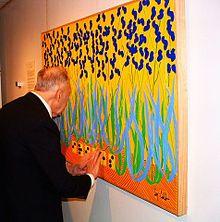
Well-known writers from Memphis include American Civil War historian Shelby Foote. Novelist John Grisham grew up in nearby DeSoto County, Mississippi, and many of his books are set in Memphis.
Many works of fiction and literature use Memphis as their setting, giving a diverse portrait of the city, its history, and its citizens. These include The Reivers by William Faulkner (1962), September, September by Shelby Foote (1977), The Old Forest and Other Stories by Peter Taylor (1985), the Pulitzer Prize-winning A Summons to Memphis by Peter Taylor (1986), The Firm (1991) and The Client (1993), both by John Grisham, Memphis Afternoons: a Memoir by James Conaway (1993), "Plague of Dreamers" by Steve Stern (1997) Cassina Gambrel Was Missing by William Watkins (1999), The Guardian by Beecher Smith (1999), "We are Billion-Year-Old Carbon" by Corey Mesler (2005), The Silence of the Lambs by Thomas Harris, and The Architect by James Williamson (2007).
Memphis is the subject of numerous pop and country songs, including "The Memphis Blues" by W. C. Handy, "Memphis, Tennessee" by Chuck Berry, "Night Train to Memphis" by Roy Acuff, "Goin' to Memphis" by Paul Revere and the Raiders, "Queen of Memphis" by Confederate Railroad, "Memphis Soul Stew" by King Curtis, "Maybe It Was Memphis" by Pam Tillis, "Graceland" by Paul Simon, "Memphis Train" by Rufus Thomas, "All the Way from Memphis" by Mott the Hoople, "Wrong Side of Memphis" by Trisha Yearwood, "Walking in Memphis" by Marc Cohn, "Stuck Inside of Mobile with the Memphis Blues Again" by Bob Dylan, "Memphis Skyline" by Rufus Wainwright, and "Sequestered in Memphis" by The Hold Steady.
In addition, Memphis is mentioned in scores of other songs, including "Proud Mary" by Creedence Clearwater Revival, "Honky Tonk Women" by The Rolling Stones, "Who's Gonna Fill Their Shoes" by George Jones, "Daisy Jane" by America, "Life Is a Highway" by Tom Cochrane, "Black Velvet" by Alannah Myles, "Cities" by Talking Heads, "Crazed Country Rebel" by Hank Williams III, "Pride (In the Name of Love)" by U2, "M.E.M.P.H.I.S." by the Disco Biscuits, "New New Minglewood Blues" by The Grateful Dead and many others.
In fact, Memphis is thought to be one of the most mentioned cities (if not the most) in recorded music. There are over 1,000 commercial recordings of over 800 distinct songs containing "Memphis" in them. The Memphis Rock N' Soul Museum maintains an ever updating list available on their website.
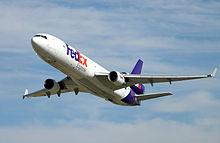
The city's central location has led to much of its business development. Located on the Mississippi River and intersected by five major freight railroads and two Interstate highways, I-40 and I-55, Memphis is ideally located for commerce in the transportation and shipping industry. A third interstate, I-69, is under construction, and a fourth, I-22, has recently been designated from the former High Priority Corridor X. River barges are unloaded onto trucks and trains. The city is home to Memphis International Airport, the world's second busiest cargo airport (following Hong Kong), which serves as the primary hub for FedEx Express shipping and was a secondary hub for Delta Air Lines after it merged with Northwest Airlines in 2008.
Memphis is the home of three Fortune 500 companies: FedEx, AutoZone, and International Paper. Other major corporations based in Memphis include Allenberg Cotton, American Residential Services (also known as ARS/Rescue Rooter), Baker, Donelson, Bearman, Caldwell & Berkowitz, Cargill Cotton, First Horizon National Corporation, Evergreen Packaging, Fred's, GTx, Guardsmark, Lenny's Sub Shop, Perkins Restaurant and Bakery, Pinnacle Airlines, ServiceMaster, Thomas & Betts, True Temper Sports, Varsity Brands, and Verso Paper. Corporations with major operations based in Memphis include Carrier, Merck & Co., Medtronic, Sharp Manufacturing, Smith & Nephew, and Technicolor Home Entertainment Services.
The entertainment and film industries have discovered Memphis in recent years. Several major motion pictures, most of which were recruited and assisted by the Memphis & Shelby County Film and Television Commission, have been filmed in Memphis, including Making the Grade (1984), Elvis and Me (1988), Great Balls of Fire! (1988), Heart of Dixie (1989), Mystery Train (1989), The Silence of the Lambs (1991), Trespass (1991), The Gun in Betty Lou's Handbag (1992), The Firm (1993), The Delta (1996), The People Vs. Larry Flynt (1996), The Rainmaker (1997), Cast Away (2000), 21 Grams (2002), A Painted House (2002), Black Snake Moan (2005), Forty Shades of Blue (2005), Walk the Line (2005), Hustle & Flow (2006), Nothing But the Truth (2008), Soul Men (2008), and The Grace Card (2011). The Blind Side (2009) was set in Memphis but filmed in Atlanta. The 1992 television movie Memphis, starring Memphis native Cybill Shepherd, who also served as executive producer and writer, was also filmed in Memphis. The state of Tennessee has lacked sufficient tax breaks available in other states to compete for many productions that have been interested in filming in Memphis or in the state as a whole. Besides The Blind Side, whose production was lured to Georgia, Memphis Beat, a television series on TNT set in Memphis, has been lured to Louisiana.
Memphis is governed by a mayor and 13 City Council members, six elected at large from throughout the city and seven elected from geographic districts. In 1995, the council adopted a new district plan which changed council positions to all districts. This plan provides for nine districts, seven with one representative each and two districts with three representatives each. The previous mayor of the city of Memphis was W. W. Herenton. He resigned from his office, effective July 30, 2009. After Herenton's resignation, Myron Lowery served as Mayor Pro Tem for less than three months, one of the shortest terms in Memphis history. Former Shelby County mayor A C Wharton is the current mayor.
In recent years, there have been often rancorous discussions of the potential of a consolidation of unincorporated Shelby County and Memphis into a metropolitan government. Consolidation was a referendum item on the 2010 ballot in Memphis and Shelby County, but failed with 85% of the county voting against it.
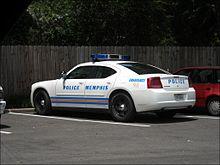
Although in 2004 violent crime in Memphis reached a record low for over a decade, that trend subsequently reversed. In 2005, Memphis was ranked the 4th most dangerous city with a population of 500,000 or higher in the U.S. Crime in Memphis increased in 2005, and saw a dramatic rise in the first half of 2006. Nationally, cities follow similar trends, and crime numbers tend to be cyclical. Local experts and criminologists cite gang recruitment as one possible cause of the rise in crime in Memphis, and a reduction of 66% of federal funding to the Memphis Police Department.
In the first half of 2006, robbery of businesses increased 52.5%, robbery of individuals increased 28.5%, and homicide increased 18% over the same period of 2005. The Memphis Police Department has responded with the initiation of Operation Blue C.R.U.S.H. (Crime Reduction Using Statistical History), which targets crime hotspots and repeat offenders. Memphis ended 2005 with 154 murders, and 2006 ended with 160. 2007 saw 164 murders, 2008 had 138, and 2009 had 132. Violent crimes dropped from 12,939 in 2008 to 12,047. Robbery dropped from 4,788 in 2008 to 4,137 in 2009. Aggravated assault dropped 53,870 in 2008 to 47,158 in 2009 (FBI's UCR). In 2006 and 2007, the Memphis metropolitan area ranked second most dangerous in the nation among cities with a population over 500,000. It also ranked as most dangerous in 2002 and second most dangerous in 2001. In 2006, the Memphis metropolitan area ranked number one in violent crimes for major cities around the U.S according to the FBI's annual crime rankings, whereas it had ranked second in 2005.
Recent statistics show a downward trend in crime in Memphis. Between 2006 and 2008, the crime rate fell by 16%, while the first half of 2009 saw a reduction in serious crime of over 10% from the previous year. The Memphis Police Department's use of the FBI National Incident Based Reporting System, which is a more detailed method of reporting crimes than what is used in many other major cities, has been cited as a reason for Memphis's frequent appearance on lists of most dangerous U.S. cities.
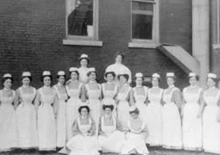
The city is served by Memphis City Schools, while surrounding suburbs in other areas of Shelby County are served by Shelby County Schools. However, on March 8, 2011, residents voted to disband Memphis City Schools, effectively merging it with the Shelby County School District. The merger will take effect effective the start of the 2013-14 school year.
The Memphis City School System is home to over 200 elementary, middle, and high schools.
The Memphis area is home to many private, college-prep schools: Briarcrest Christian School (co-ed), Christian Brothers High School (boys), Evangelical Christian School (co-ed), First Assembly Christian School (co-ed), Hutchison School (girls), Lausanne Collegiate School (co-ed), Memphis University School (boys), Saint Benedict at Auburndale (co-ed), St. George's Independent School (co-ed), St. Agnes Academy (girls), Bishop Byrne Middle and High School (co-ed), Immaculate Conception Cathedral School (girls), St. Mary's Episcopal School (girls), and Elliston Baptist Academy (co-ed). Also included in this list is Memphis Harding Academy, a co-ed school affiliated with the Churches of Christ.
Colleges and universities located in the city include the University of Memphis, Rhodes College, Memphis College of Art, LeMoyne aeOwen College, Christian Brothers University, Baptist College of Health Sciences, Memphis Theological Seminary, Harding School of Theology, Embry aeRiddle Aeronautical University, Worldwide (Memphis Campus), Reformed Theological Seminary (satellite campus), William R. Moore College of Technology, Southern College of Optometry, Southwest Tennessee Community College, Tennessee Technology Center at Memphis, Visible Music College, and the University of Tennessee Health Science Center. Memphis also has campuses of several for-profit post-secondary institutions, including Victory University (formerly Crichton College), Concorde Career College, ITT Technical Institute, Remington College, and University of Phoenix.
The University of Tennessee College of Dentistry was founded in 1878, making it the oldest dental college in the South, and the third oldest public college of dentistry in the United States.
The Christian Brothers High School Band is the oldest high school band in America, founded in 1872.
The Interstate Highways, Interstate 40, Interstate 55, and Interstate 240, are the main expressways in the Memphis area. Interstates 40 and 55 cross the Mississippi River at Memphis from the state of Arkansas.
The nearly-completed Interstate 22 connects Memphis with Birmingham, Alabama, via northern Mississippi (including Tupelo) and northwestern Alabama. This expressway follows the same route as U.S. Route 78. Other important federal highways though Memphis include the east-west U.S. Route 70, U.S. Route 64, and U.S. Route 72; and the north-south U.S. Route 51 and U.S. Route 61. The former is the historic highway north to Chicago via Cairo, Illinois, while the latter roughly parallels the Mississippi River for most of its course and crosses the Mississippi Delta region to the south, with the Delta also legendary for Blues music.
The future Interstate 69 from northeast to southwest will pass through Memphis when it is completed, linking Brownsville, Texas to the already-existing portion that runs from Indianapolis, Indiana to Port Huron, Michigan. Segments of this highway are complete in DeSoto County, just south of Memphis. The segment of the I-69 Corridor running through the Memphis area is scheduled for completion in 2012.
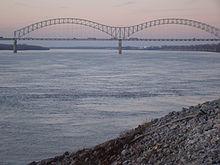

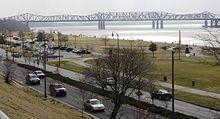
A large volume of railroad freight moves through Memphis, because of its two heavy-duty Mississippi River railroad crossings, which carry several major east-west railroad freight lines, and also because of the major north-south railroad lines through Memphis which connect with such major cities as Chicago, St. Louis, Indianapolis, Louisville, New Orleans, Dallas, Houston, Mobile, and Birmingham.
By the early 20th century, Memphis had two major passenger railroad stations. After passenger railroad service declined heavily through the middle of the 20th century, the Memphis Union Station was demolished in 1969. The Memphis Central Station was eventually renovated, and it still serves the city.
The only inter-city passenger railroad service to Memphis for many decades has been the daily City of New Orleans train, operated by Amtrak, which has one train northbound and one train southbound each day between Chicago and New Orleans.
Memphis International Airport is the global "SuperHub" of FedEx Express, and has the second largest cargo operations by volume of any airport worldwide, surpassed by Hong Kong International Airport.
Memphis International ranks as the 41st busiest passenger airport in the US and is also a secondary hub of Delta Air Lines and had 4,390,000 boarding passengers (enplanements) in 2011, an 11.9% decrease over the previous year. Delta operates around 120 daily flights to 52 destinations from the airport. Delta also operates a nonstop transatlantic flight to Amsterdam on a seasonal basis. Memphis International Airport has seen declining passenger and aircraft movements due to cutbacks by Delta Air Lines at the airport. Delta Air Lines announced the closing of its Memphis pilot base in 2012. Other airlines providing passenger service are: AirTran, American Airlines, SeaPort Airlines, United Airlines and US Airways.
There are also several general aviation airports in the Memphis Metropolitan Area, including the Millington Regional Jetport, located at the former Naval Air Station in Millington, Tennessee.
Memphis has the second-busiest cargo port on the Mississippi River, which is also the fourth-busiest inland port in the United States. The International Port of Memphis covers both the Tennessee and Arkansas sides of the Mississippi River from river mile 725 (km 1167) to mile 740 (km 1191). A focal point of the river port is the industrial park on President's Island, just south of Downtown Memphis.
Four railroad and highway bridges cross the Mississippi River at Memphis. In order of their opening years, these are the Frisco Bridge (1892, single-track rail), the Harahan Bridge (1916, a road-rail bridge until 1949, currently carries double-track rail), the Memphis-Arkansas Memorial Bridge (Highway, 1949; later incorporated into Interstate 55), and the Hernando de Soto Bridge (Interstate 40, 1973).
Memphis's primary utility provider is the Memphis Light, Gas and Water Division (MLGW). This is the largest three-service municipal utility in the United States, providing electricity, natural gas, and pure water service to all residents of Shelby County. Prior to that, Memphis was served by two primary electric companies, which were merged into the Memphis Power Company. The City of Memphis bought the private company in 1939 to form MLGW, which was an early customer of electricity from the Tennessee Valley Authority.
MLGW still buys most of its power from TVA, and the company pumps its own fresh water from the Memphis Aquifer, using more than 180 water wells.
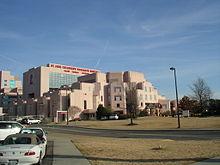
The Memphis and Shelby County region supports numerous hospitals, including the Methodist and Baptist Memorial health systems, two of the largest private hospitals in the country.
Methodist Le Bonheur Healthcare, the largest healthcare provider in the Mid-South, operates seven hospitals and several rural clinics. Modern Healthcare magazine ranked Methodist Healthcare in the top 100 integrated healthcare networks in the United States. Methodist Healthcare operates, among others, the Le Bonheur Children's Hospital, which offers primary level 1 pediatric trauma care, as well as a nationally recognized pediatric brain tumor program.
Baptist Memorial Healthcare operates fifteen hospitals (three in Memphis), including Baptist Memorial Hospital. According to Health Care Market Guide's annual studies, Mid-Southerners have named Baptist Memorial their "preferred hospital choice for quality".
The St. Jude Children's Research Hospital, leading pediatric treatment and research facility focused on children's catastrophic diseases, resides in Memphis. The institution was conceived and built by the late entertainer Danny Thomas in 1962 as a tribute to St. Jude Thaddeus, patron saint of impossible, hopeless, and difficult causes.
Memphis is also home to the Regional Medical Center at Memphis, which is locally referred to as "The Med". In recent years, the hospital has experienced severe funding difficulties that nearly led to a reduction or elimination of emergency room services. In July 2010, The Med received approximately $40.6 million in federal and local funding to keep the Elvis Presley Trauma Center operational.
Memphis is home to Delta Medical Center of Memphis, which is the only employee-owned medical facility in North America.
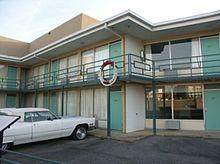

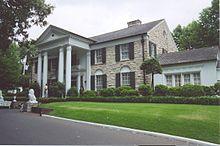
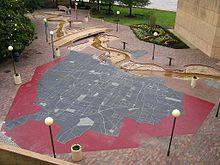
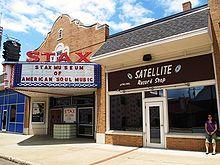
 Media related to Museums in Memphis, Tennessee at Wikimedia Commons
Media related to Museums in Memphis, Tennessee at Wikimedia Commons
Many museums of interest are located in Memphis.
National Civil Rights Museum
Brooks Museum of Art
Belz Museum of Asian and Judaic Art
Dixon Gallery and Gardens
Children's Museum of Memphis
Graceland
Pink Palace
Memphis Walk of Fame
Mud Island River Park
Victorian Village
Cotton Museum
Stax Museum
Chucalissa Indian Village
 Media related to Parks in Memphis, Tennessee at Wikimedia Commons
Media related to Parks in Memphis, Tennessee at Wikimedia Commons
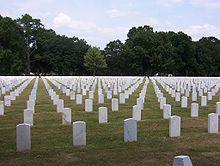
Major Memphis parks include W.C. Handy Park, Tom Lee Park, Audubon Park, Overton Park including the Old Forest Arboretum, the Lichterman Nature Center (a nature learning center), the Memphis Botanic Garden, and Jesse H Turner Park.
Shelby Farms park, located at the eastern edge of the city, is one of the largest urban parks in the United States.
 Media related to Cemeteries in Memphis, Tennessee at Wikimedia Commons
Media related to Cemeteries in Memphis, Tennessee at Wikimedia Commons
The Memphis National Cemetery is a United States National Cemetery located in north Memphis.
Historic Elmwood Cemetery is one of the oldest rural garden cemeteries in the South, and contains the Carlisle S. Page Arboretum. Memorial Park Cemetery is noted for its sculptures by Mexican artist Dionicio Rodriguez.
Elvis Presley was originally buried in Forest Hill Cemetery, the resting place of his backing band's bassist, Bill Black, but after an attempted grave robbing, his body was moved to the grounds of Graceland.
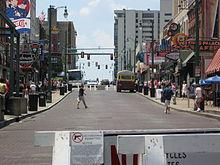
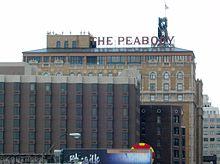
Beale Street
Memphis Zoo
Peabody Hotel
Sun Studio
The Orpheum Theatre
The New Daisy Theater
Mud Island Amphitheater
The Pyramid
It has been host to the University of Memphis NCAA basketball team, the Memphis Grizzlies NBA team, the Great Midwest Conference basketball tournament, the Southeastern Conference basketball tournament, the Conference USA basketball tournaments, and the 2003 Conference USA women's basketball tournament. It has also hosted first and second rounds of the NCAA Tournament and a pay-per-view event by the WWF. The Pyramid was the venue of the boxing match between Lennox Lewis and Mike Tyson in 2002.
In 2008, the City of Memphis began leasing The Pyramid to Bass Pro Shops; the facility is to become Bass Pro's largest superstore in the country with a projected grand opening by August 2013.[dated info]
Other
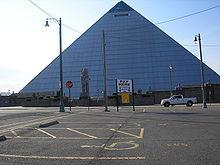
The University of Memphis college basketball team, the Memphis Tigers, has a strong following in the city due to a history of competitive success. The Tigers finished 2nd to the Kansas Jayhawks in the 2008 NCAA Men's Division I Basketball Championship. However, in 2009, an NCAA investigation revealed that Derrick Rose's SAT scores had been invalidated, making him retroactively ineligible to play for Memphis. As a result, the NCAA vacated Memphis' entire 2007 ae08 season, including the tournament appearance, and forced the University to repay all tournament revenues. Head Coach John Calipari, who left Memphis to coach for the University of Kentucky, was not reprimanded by the NCAA. The current coach of the Memphis Tigers is Josh Pastner, who coached the Tigers to NCAA appearances in two of his first three seasons on the job.
The Memphis Grizzlies of the National Basketball Association is the only club from one of the "big four" major sports leagues in the city; however, the minor leagues are well represented. The Memphis Redbirds of the Pacific Coast League is a Class AAA baseball farm team for the St. Louis Cardinals. The Mississippi RiverKings, formerly the Memphis RiverKings, is a professional hockey team of the Central Hockey League "Class AA" which plays its home games in DeSoto County.
Memphis is home to Liberty Bowl Memorial Stadium, the site of University of Memphis football, the Liberty Bowl and the Southern Heritage Classic. The annual St. Jude Classic, a regular part of the PGA Tour, is also held in the city. Each February the city hosts the Regions Morgan Keegan Championships and the Cellular South Cup, which are men's ATP World Tour 500 series and WTA events, respectively.
Memphis has a significant history in pro wrestling. Jerry "The King" Lawler is the sport's greatest name to come out of the city. Sputnik Monroe, a wrestler of the 1950s, like Lawler, promoted racial integration in the city. Ric Flair also noted Memphis as his birthplace.
Memphis has been represented by several now-defunct professional sports franchises, including the Memphis Pharaohs of Arena Football, the Memphis Maniax of the XFL, the Memphis Xplorers of the AF2, the Memphis Showboats of the USFL, the Memphis Southmen of the WFL, the Memphis Houn'Dawgs of the ABA, the Memphis Sounds of the original ABA in the late 1960s and early 1970s, and the Memphis Mad Dogs of the CFL.
In the 1970s and early 1980s, the former WFL franchise Memphis Southmen / Memphis Grizzlies sued the NFL in an attempt to be accepted as an expansion franchise. In 1993, the Memphis Hound Dogs was a proposed NFL expansion that was passed over in favor of the Jacksonville Jaguars and Carolina Panthers. Memphis also served as the temporary home of the former Tennessee Oilers while the city of Nashville worked out stadium issues.
Major broadcast television affiliate stations in the Memphis area include, but are not limited to:

Word Count: 7159







